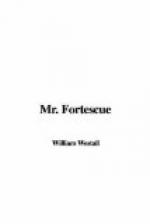Before a long table at the upper end of a large, barely-furnished room, with rough walls and a cracked ceiling, sat three men in uniform. The one who occupied the chief seat, and seemed to be the president, was old and gray, with hard, suspicious eyes, and a long, typical Spanish face, in every line of which I read cruelty and ruthless determination. His colleagues, who called him “marquis,” treated him with great deference, and his breast was covered with orders.
It was evident that on this man would depend my fate. The others were there merely to register his decrees.
After leading me to the table and saluting the tribunal, the officer of police, whose sword was still drawn, placed himself in a convenient position for running me through, in the event of my behaving disrespectfully to the tribunal or attempting to escape.
The president, who had before him the letter to Senor Ulloa, my passport, and a document that looked like a brief, demanded my name and quality.
I told him.
“What was your purpose in coming to Caracas?” he asked.
“Simply to see the country.”
He laughed scornfully.
“To see the country! What nonsense is this? How can anybody see a country which is ravaged by brigands and convulsed with civil war? And where is your authority?”
“My passport.”
“A passport such as this is only available in a time of peace. No stranger unprovided with a safe conduct from the capitan-general is allowed to travel in the province of Caracas. It is useless trying to deceive us, senor. Your purpose is to carry information to the rebels, probably to join them, as is proved by your possession of a letter to so base a traitor as Senor Ulloa.”
On this I explained how I had obtained the letter, and pointed out that the very fact of my asking the posadero to direct me to Ulloa’s house, and going thither openly, was proof positive of my innocence. Had my purpose been that which he imputed to me, I should have shown more caution.
“That does not at all follow,” rejoined the president. “You may have intended to disarm suspicion by a pretence of ignorance. Moreover, you expressed to the senor posadero sentiments hostile to the Government of his Majesty the King.”
“It is untrue. I did nothing of the sort,” I exclaimed, impetuously.
“Mind what you say, prisoner. Unless you treat the tribunal with due respect you shall be sent back to the carcel and tried in your absence.”
“Do you call this a trial?” I exclaimed, indignantly. “I am a British subject. I have committed no offence; but if I must be tried I demand the right of being tried by a civil tribunal.”
“British subjects who venture into a city under martial law must take the consequences. We can show them no more consideration than we show Spanish subjects. They deserve much less, indeed. At this moment a force is being organized in England, with the sanction and encouragement of the British Government, to serve against our troops in these colonies. This is an act of war, and if the king, my master, were of my mind, he would declare war against England. Better an open foe than a treacherous friend. Do you hold a commission in the Legion, senor?”




